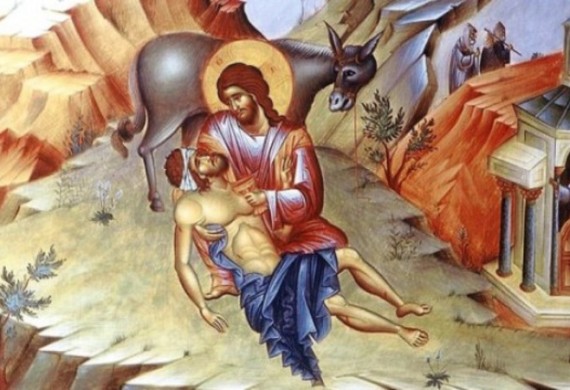All of humanity lives in community. On the basic level, we have the family. From there we move up to the village/town, and then to cities. Over all of that is the nation-state. Because a person belongs to a particular community, it is natural for everyone to be concerned first with the prosperity of their own country, their own city and their own family. If something happens to one of their compatriots, they will rush to help. Alternatively, if they are far from home and they meet another person from their homeland, they will feel a connection and do for them as best they can.
The key question is: What if in my life I meet an unknown person, someone who is a total stranger? Perhaps they are from a different country, or another religion. This person may be ill or hungry, and they ask for my help. Do I give it?
Our Lord answered this question today with the parable of the Good Samaritan. We know that the Jews regarded the Samaritans as enemies and did not want to have any dealings with them. They also saw them as heretics to be shunned. Here we see the Samaritan travelling, and he sees a Jewish man, fallen and badly wounded by thieves. He didn’t think about their differences. The fact that he was a Jew was not on his mind. He got off his animal, treated his wounds, and put the wounded man on his animal to take him to the nearest Inn. He told the innkeeper to care for him, and gave money to do this. The Samaritan left with the promise that he would pay for any extra care that should become necessary.
This is what the Good Samaritan did. Why did Jesus tell us this parable?
Because when we speak of others, we usually distinguish between “Us” and “Them.” We say “our people” and “foreigners” or “friends” and “enemies.” If the other person is “one of us,” my friend and my compatriot, we will express love and help in whatever way they need. But if they are from another race, another country or another religion, we avoid them. We do this even if we see them in a great deal of need.
Christ teaches us with this parable how thinking in this way must be corrected. It is completely wrong. We can’t just love our own people and our friends. When we do this, we show ourselves to be bad Christians. Let’s learn to love all people, without distinguishing between friend or foe, compatriot and foreigner. A Christian who loves only their friends is no Christian at all. To be a Christian means to love everyone and is devoted to helping those who need it. A Christian is one who smiles at strangers, forgives enemies and does so without expecting anything in return.
This is why we have as a model the Good Samaritan. For our sake, our Lord Jesus Christ taught us love to all. Not only in his perfect words, but above all in his supreme example! Christ came to earth and found humanity, mortally wounded and fighting against God. He brought them to Himself in His Church, and redeemed humanity from the tyranny of Satan. And all of this,with the sacrifice of His life on the Cross. This example of His love to everyone can also inspire us in our interactions with others, to all people. Amen.
Metropolitan Sotirios of Pisidia
Sermon of 8th Luke.The Good Samaritan (Luke 10:25-37)

